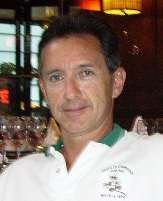Robert Gerlai
| Robert T. Gerlai | |
|---|---|
 Robert Gerlai, August 2009 | |
| Born |
1960 (age 56–57) Budapest, Hungary |
| Residence | Toronto, Canada |
| Citizenship | Canadian |
| Nationality | Hungarian |
| Fields | Behavior genetics |
| Institutions | University of Toronto |
| Alma mater | Eötvös Loránd University |
| Doctoral advisor | Vilmos Csanyi |
| Doctoral students | Noam Miller, Christine Buske, Yohaan Fernandes, Steven Tran, Soaleha Shams, Diane Seguin, Samantha Mahabir |
Robert T. Gerlai (Gerlai Róbert, Budapest, 1960) is a Hungarian-born Canadian behaviour geneticist. He obtained his PhD in 1987 from the Eötvös Loránd University and the Hungarian Academy of Sciences in Budapest. He has worked in the biotechnology (Genentech) and biopharmaceutical research industries (Eli Lilly and Company and Saegis Pharmaceuticals) as senior scientist and executive as well as at different universities. Currently, he is full professor of psychology at the Department of Psychology at the University of Toronto.[1] The Web of Science lists over 180 peer-reviewed publications for him, which have been cited over 8000 times, resulting in an h-index of 47.[2] Gerlai has worked with several different animal species, including paradise fish and mice. He has been using zebrafish in his research for the past 15 years, and studies the effects of alcohol on brain function and behaviour, including social behaviour, fear-anxiety, and learning and memory.[1][3]
Honors
Gerlai is an elected Fellow of the International Behavioral Neuroscience Society, of which he also has been president.[4] He is a member of the editorial boards of Genes, Brain and Behavior,[5] Neurotoxicology and Teratology,[6] Learning and Behavior,[7] and Current Opinion in Behavioral Sciences. He is section editor for behavioral neuroscience of BMC Neuroscience.[8] In 2013, Gerlai received the Distinguished Scientist Award from the International Behavioural and Neural Genetics Society.[9] In 2015 he received the Research Excellence Award from the University of Toronto.[10]
References
- 1 2 "Gerlai Laboratory @ The University of Toronto, Mississauga". Retrieved 2009-04-15.
- ↑ Science Citation Index. Web of Science (Science ed.). Thomson Reuters. 2014-10-13.
- ↑ Wilkes, Jim (6 February 2011). "Drunk fish may hold secrets to alcoholism in humans". Toronto Star. Toronto. Retrieved 2015-08-04.
- ↑ "Past Presidents". International Behavioral Neuroscience Society. Retrieved 2015-08-04.
- ↑ "Journal Information". Genes, Brain and Behavior. doi:10.1111/(ISSN)1601-183X/homepage/EditorialBoard.html (inactive 2017-04-12). Retrieved 2015-08-04.
- ↑ "Neurotoxicology and Teratology Editorial Board". Neurotoxicology and Teratology. Elsevier. Retrieved 2015-08-04.
- ↑ "Editorial board". Learning & Behavior. Retrieved 2015-08-04.
- ↑ "Section Editors". BMC Neuroscience. BioMed Central. Retrieved 2015-08-04.
- ↑ "IBANGS Awards". International Behavioural and Neural Genetics Society. Retrieved 2013-11-19.
- ↑ "Desmond Morton Research Excellence Award - Research". University of Toronto Mississauga. Retrieved 12 April 2017.